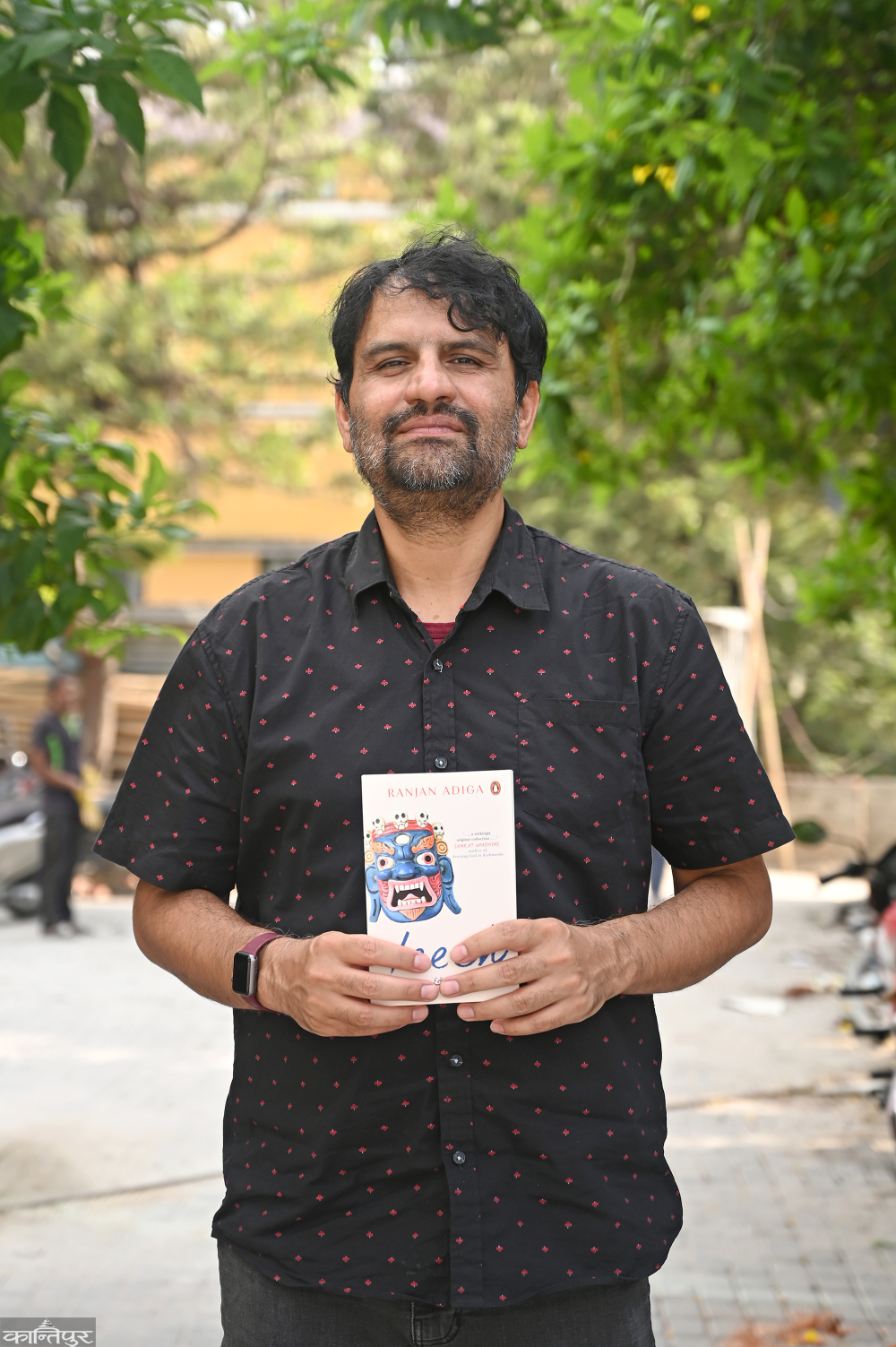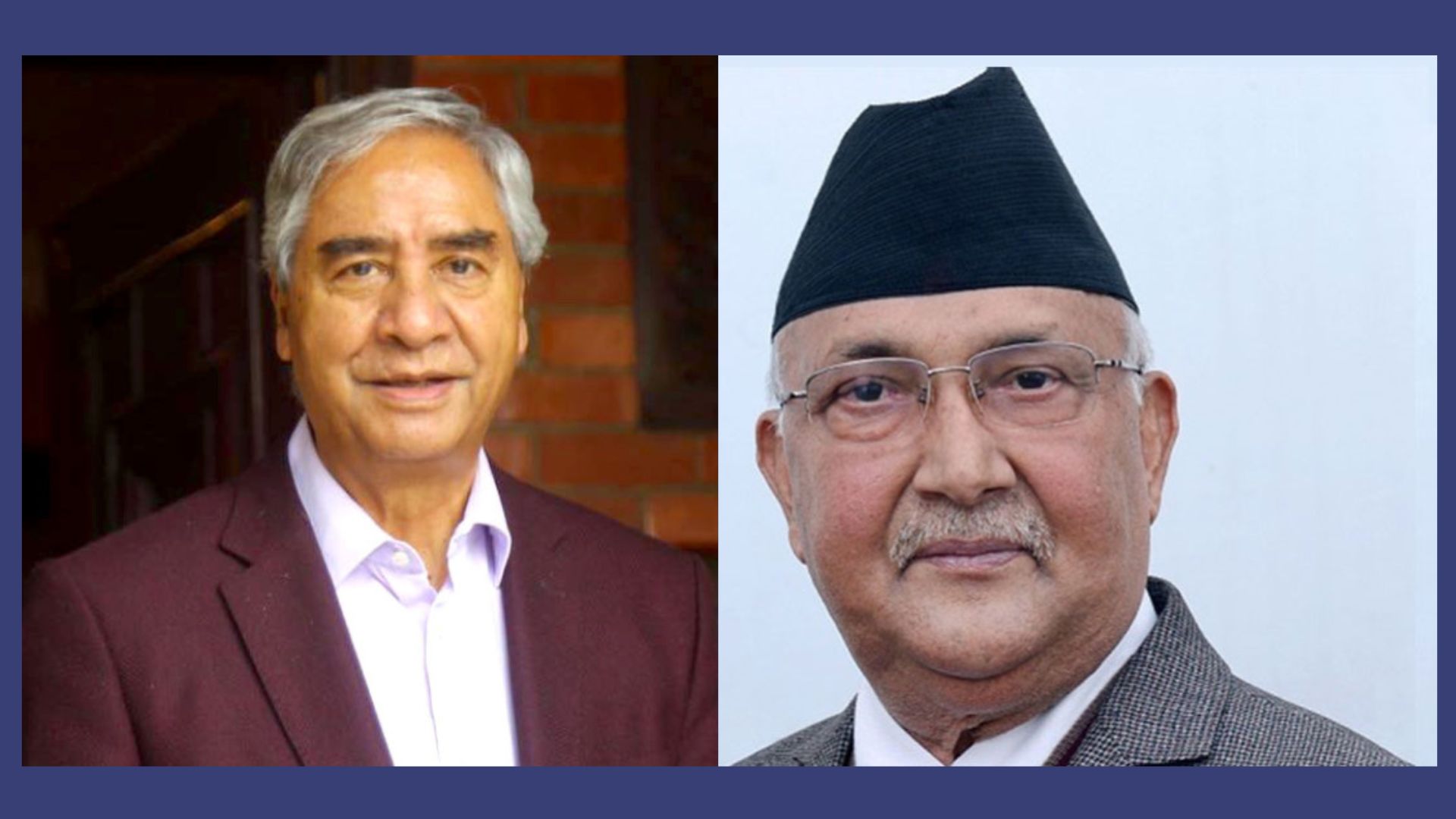Emerging Storyteller of Immigrants
We use Google Cloud Translation Services. Google requires we provide the following disclaimer relating to use of this service:
This service may contain translations powered by Google. Google disclaims all warranties related to the translations, expressed or implied, including any warranties of accuracy, reliability, and any implied warranties of merchantability, fitness for a particular purpose, and noninfringement.


What gifts should an author give their characters? Ranjan Adiga hesitated for a moment before answering. And he said, 'I give those happiness, which you are not getting yourself.' His collection of stories - Lich and Other Stories has just come out from 'Penguin Randomhouse'.



And, to find out about it, he has come to his native Nepal after taking a break from his professorial job in America. From the meetings and interactions he is currently having in Kathmandu, Ranjan is realizing some new facts. Being recognized outside is one thing, his experience says that the greatest happiness for a writer is being recognized in the country or the greatest unhappiness is not being recognized in the country.
After a long effort to reach the international market, the book was published by Penguin, and after returning to Nepal, he ran into the bookstores of Kathmandu. Seeing his books on display at the front of the store gave him an instant sense of satisfaction as a writer. In a contented mood, people may become humorous. Probably the same thing happened to Ranjan when he reached the book shop in Patandhoka, after showing his own book, he thought of chatting with the shopkeeper about it.
'Whose book is this?' he asked the shopkeeper. This question was prompted by the eagerness to know what the shopkeeper was saying about himself. 'This is by an Indian author,' the shopkeeper picked up the book interestingly and said, 'You should read it, there is an interesting story in it'
only in that shop The author of his book was not identified as Indian, as many other shops said. Ranjan was somewhat shocked by the shopkeeper's answer, but was not surprised. "I know, there are no people who know me in my country," he says, "and I don't complain about it."
 author Ranjan Adiga . Photo: Angad Dhakal/Kantipur
author Ranjan Adiga . Photo: Angad Dhakal/Kantipur
Pashupati's grandfather, who came to Nepal from South India, settled here. This was not the first time that he had been living in America for a long time when his surname was the only one in the entire population of 30 million people. And, probably won't be the last either unfortunately. 'Not only here, this is my situation in America,' says Ranjan, 'there they call me Asian, when I go to India they call me Nepali and when I go to Nepal, I am always a homeless person.' The realization of this feeling probably made him a writer. That is why there are many Nepali characters who have migrated in his story, when reading it, the reader gets a clear understanding of the mood of the marginalized in the contemporary society. Whether it is Ram who is struggling from Janakpur to Kathmandu or Sameer who is trying to belong there after reaching America from Kathmandu, both of them find themselves in the mood of wandering outside the mainstream society.
The story ends when Juneli, an elite girl from Kathmandu, secretly loves Ram and meets a bitter fate and the question of what will happen next when they are separated. On the one hand, Pir is not able to earn money like Sameer, who is struggling to meet the expenses needed to fit in the life there after getting a DV in front of the 'Sharmaji' who have risen to the class of rich people in America. Sameer's life in Kathmandu is grand before Ram's life. However, his destiny in Denver is not as fast as Ram's.
The elite class of Kathmandu called the struggling Ram from the periphery a 'lich', a parasite who tried to trap a rich girl in a trap and bake bread for his own selfishness. On the other hand, his wife, who was attracted by the magnificence of Sharmaji in Denver, called Sameer a 'narrow-minded man'. A comparative analysis of these two stories gives an idea of what kind of stories Ranjan prefers to write.
'I love to capture the lives of those who do not count in the mainstream society in the story,' says Ranjan, 'In any country and society, there are always marginal people, who are not counted by the mainstream, but I try to show in the story that they have the same human feelings as others. The only similarity between all the characters of Ranjan, who depicted the lifestyle of Nepal and America in the
story, is that they are all Nepalis. Why didn't Ranjan, who was encouraged to speak English since birth, was taught at St. Xavier's school to pursue his dreams of going to America, and finally went to America to get a degree in creative writing, where he has been teaching this subject for ten years? This question asked in a recent evening chat was probably expected for him.
'No matter how many decades I've lived in America and no matter how well I've come to read English literature, writing about whites is creating superficial literature,' says Ranjan, 'because writing a story about a life and culture that I haven't experienced is original and authoritative. It is not to write literature.' Being the original priest of one of the largest pilgrimage sites of Hindus, having an elite family and being a man are essential foundations for establishing a mainstream life in Nepal. However, when the same person reaches America, he is facing an identity crisis, he experienced this. And, when he comes back to the country after many years, the country considers him a foreigner. Even though he once reached a village in South India's Karnataka in search of his ancestral home after seeing himself considered as an Indian by the surname 'Adiga'. However, no one knew him there and he could not understand anyone's language. Ranjan has no different opinion that such uprooted experience is a great raw material of creation for a writer.
 'We all lack something in our lives,' says Ranjan, 'but for a writer, the sense of that lack is the writer's energy.' Born in Dillibazar, Kathmandu, Ranjan is sad that he does not have a grasp of the Nepali language. The realization that one must be proficient in one's own language to understand one's own literature, history, philosophy and society hits him home. After the Asian edition of his collection of 10 stories, 'Lich and Other Stories', Penguin Random House is also publishing from the US in September for readers around the world. Ranjan, who recently joined the ranks of writers Manjushree Thapa and Samrat Upadhyay, who played a role in bringing Nepali literature to the international market, is returning on Monday for the changes to be made before the publication of the American edition.
'We all lack something in our lives,' says Ranjan, 'but for a writer, the sense of that lack is the writer's energy.' Born in Dillibazar, Kathmandu, Ranjan is sad that he does not have a grasp of the Nepali language. The realization that one must be proficient in one's own language to understand one's own literature, history, philosophy and society hits him home. After the Asian edition of his collection of 10 stories, 'Lich and Other Stories', Penguin Random House is also publishing from the US in September for readers around the world. Ranjan, who recently joined the ranks of writers Manjushree Thapa and Samrat Upadhyay, who played a role in bringing Nepali literature to the international market, is returning on Monday for the changes to be made before the publication of the American edition.
His own experiences as a first-generation American immigrant are weaved through the stories of many characters. "There are two main ways of writing a story, one is completely imaginative and the other is completely based on reality," he says The extended diaspora of Nepal was completely overshadowed as the names of Indian or Pakistani writers appeared as soon as the experiences of South Asian migrants were mentioned in literature. This situation has been removed to some extent by 'Lich and Other Stories'.
Throughout the collection, his characters face the complexities of creating a new identity in a foreign land. Even though he wrote a story about the displacement of a Nepali character, it matches the feelings of any person in the world who has reached a place other than home in the trouble of immigration. Because, regardless of the joy and wonder and happiness and sadness that people of any social status do, it is linked to the eternal feeling of humanity. With this in mind, Penguin has arranged book publishing for readers in both Asia and America within a few months.
 प्रकाशित : असार १५, २०८१ ११:१५
प्रकाशित : असार १५, २०८१ ११:१५
 २८.१२°C काठमाडौं
२८.१२°C काठमाडौं


















